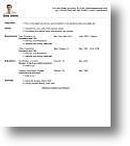- What is a Chronological Resume?
A chronological resume is the type employers and hiring managers are more accustomed to viewing. The layout of this format lists the specific dates of your experiences and education.
Ordered by time, all listings are placed with your most recent activity first, in descending order to the oldest. Display each skill or achievement that you have gained from working during that particular time as a bullet point with a brief description explaining how it relates to the new job. - What is a Functional Resume?
A functional resume is not as conventional as the other format. Use this type to emphasize any specific skills or strengths that you may have. Functional resumes are different in that they generally tend to shift the focus away from the dates and the lengths of time that jobs were held and schools were attended.
A major structural variation is that your work experience section is added after your skills and accomplishments sections. The idea is that the skills you have acquired validate the positions that you have held in a professional setting. - When Do I Use a Chronological Resume?
Since this is the most traditional version, most people will choose this type. This format is best for those who have limited gaps in their experience, have relevant education, have relevant experience, and have preferably held jobs for long periods.
Advantages: Chronological resumes are great because they appear in a traditional format that employers are used to reading. This type can also do a nice job of illuminating your commitment to working if you have put extended time into a job position.
Disadvantages: Although this format is common, there are still some issues with it. This type makes it very easy to see if there are any employment gaps, unrelated jobs held, or jobs worked for a short duration. - When Do I Use a Functional Resume?
A functional resume is best in several situations, such as those where you do not wish to disclose years or lengths of time directly. An excellent example of this is if you have the experience, but you have employment gaps in between your jobs. Instead of the recruiter focusing on the aggregate experience you have gained over the years. Their attention will focus on the time you spent not working in your field. The same is true if you have an unrelated education. An example of when it may be beneficial to use a functional resume is when you are attempting to transfer your job skills to gain access to a new field. Also, when you lack professional experience in your field or you have too much variation in your experiences.
Advantages: Functional resumes are great to minimize the appearance of a limited or short work history. One feature that a functional resume utilizes is a bulleted list of the characteristics that you have gained from all of your experience and education. They also give you the flexibility to arrange the sections differently from what is typical. There are templates where you can vary the section order already built into our free creator app.
Disadvantages: A downfall when it comes to this format is that, as mentioned before, these are unconventional. Therefore, employers are not as comfortable with them. Additionally, they tend to de-emphasize your training and work experience focusing more on your characteristics, but you might need that.
Resume Types Functional vs. Chronological
Functional or chronological resumes what format should I use? Learn the differences between the two most common resume formatting types and when it is best to use each of them.
 There are several resume formats, all of which have a specific purpose. However, two stand out as the most commonly used, functional and chronological resumes.
There are several resume formats, all of which have a specific purpose. However, two stand out as the most commonly used, functional and chronological resumes.
You can combine aspects of either type to optimize one or more sections. You may find this tactic useful to bolster a weak section or minimize a less desirable one.
Resume Types
 There are several resume formats, all of which have a specific purpose. However, two stand out as the most commonly used, functional and chronological resumes.
There are several resume formats, all of which have a specific purpose. However, two stand out as the most commonly used, functional and chronological resumes.
You can combine aspects of either type to optimize one or more sections. You may find this tactic useful to bolster a weak section or minimize a less desirable one.